One of the things I was super excited about when I started this newsletter was something I’m obviously calling “Eating Pizza With a Cool Person”. The idea is pretty simple: I reach out to someone I admire who is doing helpful, unique or interesting things in Chicago, offer to take them out for pizza, and we have a conversation.
Penny Gibbons is the founder of Trash People of Logan Square, a grassroots non-profit that does hyperlocal cleanup events. Springboarding off the success of Trash People, she’s also launched The Volunteer Fair, which aims to introduce people ready to volunteer in their communities to non-profits who can definitely use their help, as well as The Parlor, a resource redistribution project that works with community partners to redistribute donated items to underserved and vulnerable communities all over the city.
I met Penny at her favorite pizza place, Paulie Gee’s in Logan Square, where we each got our own pizza (Penny likes their wood fired but I have to go with their Detroit), and talked about her childhood in the British countryside, how she accidentally ended up in Chicago, what it was like for her to navigate the pandemic while being 5,000 miles away from her family and how she used that experience as motivation to meet new people (and start picking up trash with them), and what cleaning up a neighborhood can teach you about the people who live there.
It’s impossible to talk with Penny and not walk away impressed and inspired by her compassion, dedication, kindness, and ambition. She’s done so much good in Chicago in just two short years, and I can’t wait to see what she sets her sights on next.
CPN: Is it safe to assume you live in Logan Square?
Penny: I accidentally moved to Logan Square. In 2016, I was meant to be in Chicago for one month. I came out just to set up an account for the company I was working for in London. And then they asked me to come back for three months. Which I did. And then they said, do you want to stay on and get your Visa? So I went through the process of getting my green card because I felt like, if you’re going to be here for a long time, might as well have that option. And what if I meet someone, but I don’t want to get married? What if I want to travel, or move somewhere else in the country? So I got my green card in 2021, and just after that is when I left my job and started doing all the things I actually care about.
CPN: Where did you grow up?
Penny: In the British countryside in a very tiny village. It was very rural. But it was a very charming childhood.
CPN: What was the name of the village?
Penny: Halford.
CPN: Like Rob Halford?!?
Penny: I don’t know who that is? But yeah, Halford. It was a typical 90s countryside upbringing. Not much technology. My neighbor had sheep, so I would help him with the sheep, even though I was probably more of a hindrance than a help at that age. But I thought I was helping at the time. So I’m a country girl, really.
CPN: How often do you go back?
Penny: Pretty regularly now. Obviously the pandemic was a long period where I couldn’t travel because I wasn’t able to leave the country on the Visa I had at that time. And that does feed into the whole story because that was an incredibly isolating time for me. I didn’t have a family that I could fall back on, so I was really reliant on a lot of friendships I’d made since moving. But I have a brother, and he has two young children, so I have a four-year-old nephew and a two-year-old niece, and part of my ambition at this phase in my life is just to spend as much time with family as possible, even though it can be difficult since I live 5,000 miles away. I go two or three times a year, which is quite a lot. Not always easy, but I want to see them grow up.
CPN: Is your family still in Halford?
Penny: Now they live in Stratford-upon-Avon, which is the closest town. That’s actually Shakespeare’s town. So a lot of Americans have actually been to my town now because it’s such a popular tourist spot.
CPN: What kind of pizza do you grow up eating in the English countryside?
Penny: Honestly, it was rural enough that I don’t think we had a pizza shop anywhere near us. And this was before delivery. So I don’t recall eating pizza as a child. I can tell you if we did eat pizza, it would have been a frozen pizza from the supermarket. Which is so sad. But where I’m from, there was no diversity of food options. We had one Chinese restaurant. And one Indian restaurant. In that part of the countryside, there weren’t a lot of options. The first big city I moved to was Nottingham, where I went for university, and then London a few years later. So that’s really where my culinary adventures started, because those were the places that had interesting food.
CPN: Do you remember a pizza there that you really liked? Is there a certain style that’s really popular in London or Nottingham?
Penny: Not really, no.
CPN: Is it just, here’s some generic Italian pizza?!?
Penny: Faux-Italian. Yeah. Greasy food. Late night food. That’s what I remember in Nottingham. As someone who loves Italy, it’s my favorite country, I have so much appreciation and respect for genuine Italian food, and British people can’t touch it.
CPN: No one else can touch it.
Penny: Having lived in Europe, I’ve been fortunate enough to travel to Italy a few times, and I’ve had so many incredible food experiences there.
CPN: Do you have a favorite pizza from Italy?
Penny: I couldn’t tell you that much about it, but I do. I went on this retreat in the Italian countryside in the middle of nowhere, and there was a restaurant connected with the hotel. And it was a countryside hotel where the buildings were all over the place, so you had to walk like ten minutes down the road to get to the other part of the hotel. So the restaurant was another ten-minute walk down this beautiful path. And it was called Tre Laghi, which is three lakes, because it’s nestled between these three lakes. And it’s just so beautiful. Every night they would prepare this absolute feast, and there was always a pizza course. So you have a full meal, but you also have your pizza course as well.
CPN: That sounds like it would be incredibly hard to top.
Penny: While I can’t remember any specific pizza, I will always remember eating pizza between these three lakes in this Italian countryside setting that’s just stunning.

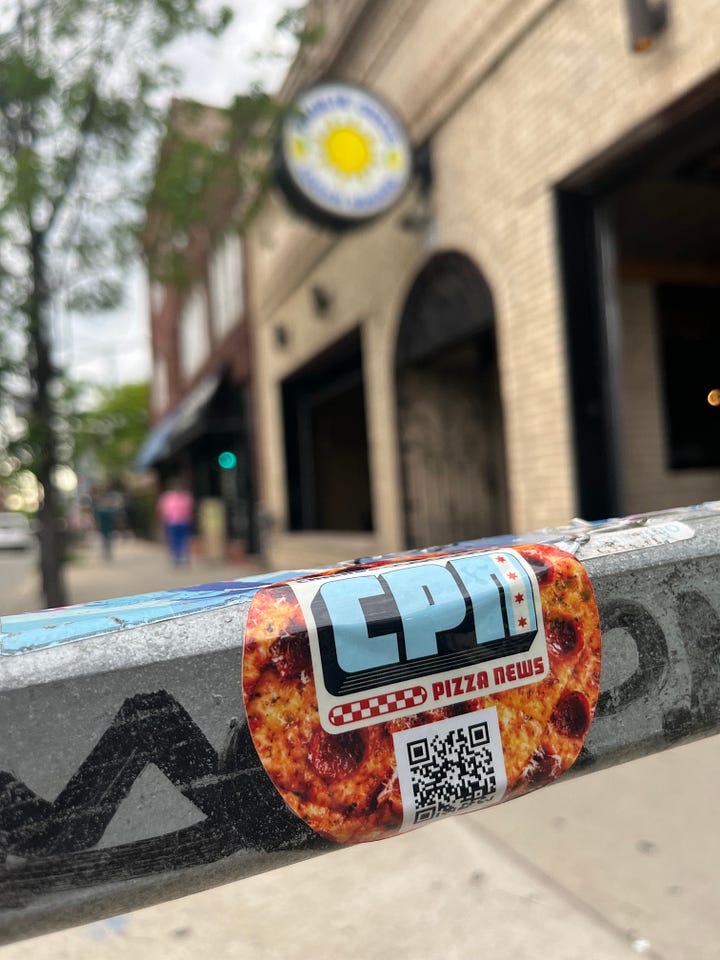
CPN: Do you remember your first time having Paulie Gee’s?
Penny: These are hard questions! I might have had Paulie Gee’s the first time when I was across the road at Estereo and got hungry. I’d come in here and grab takeout and eat it at the bar over there. It’s wonderful.
CPN: Why is it your favorite pizza in Chicago?
Penny: As someone who has a lot of principles and values, one thing that’s really important to me is to support small local businesses, and support businesses that mirror my values. Seeing the way that Paulie Gee’s is run, and the way they support the community — the pizza is absolutely delicious — but I can see that support.
CPN: What do you love about Chicago?
Penny: So many things. This time of year is incredible. I love the spring. I love seeing everybody brighten up, having not realized that we all have seasonal affective disorder! The gradual decline of everyone’s mood and well-being, then suddenly we’re all feeling much better. This is my favorite time of year. And I love Chicagoans. I really love that, and this is me comparing to all my experience with British people, if Chicagoans aren’t satisfied with a situation they’ll do something about it. There’s a community that will mobilize to get stuff done. I really respect and admire that. There’s a lot less apathy than you see in other places.
CPN: What do you think could make Chicago better?
Penny: We’re getting into my work now, is that okay?
CPN: Absolutely. Let’s get into it.
Penny: What could make any city better is people really engaging in community. Participating in community work, or building new systems for the community. More people stepping up to lead those types of things would be wonderful.
CPN: Where did the initial idea for Trash People come from?
Penny: As I mentioned, the pandemic was a really low point for me. It was a perfect storm of things that happened in my life. At the time, I was working at a really stressful job. It was remote-ish anyway, I was working with a lot of people in Europe. I was living alone, having had a pretty terrible relationship. Then layering the pandemic on top of that. And I really didn’t have any kind of support system around me at the time. It was really bad. I came out the other side with some glimmers of hope, I had two or three friends I had really kept in touch with during that time, but we weren’t super close. I just thought, I do not want my life to look like this. And because I didn’t have family to fall back on here, it was up to me to figure out who was going to be my community? Who did I want to spend my time with? Who do I call when I have a problem? Who’s my emergency contact? Those are all things that, when you’ve moved to a whole continent by yourself, you need to figure out. I thought, where can I meet the kind of people that I want to meet? When I first moved here, I had kind of fallen in with a group of people who were really nice, but maybe weren’t as aligned with me as I would have liked in terms of sharing values and things like that. So that was really important to me. To find people that cared as much as I did. That validated my feelings about the environment, and community. So where can I finally meet this people? And I thought the kind of people I want to meet would be willing to pick up trash with total strangers on a Saturday morning. So I had the idea. Then I came up with the name. And I thought this is so silly and ridiculous that people in this neighborhood would really enjoy this. It’s utter nonsense. Then it took me about six to nine months between having the idea and actually doing it. It’s a really interesting thing for me to look back on because now I’m pretty fearless with my new ideas, and I’ll just throw something out there and get working on it. It makes me wonder how many other awesome are out there, but people are too scared.
CPN: Starting is hard. Starting something new, especially by yourself, it can be the hardest part.
Penny: The catalyst ended up being someone on the Logan Square community page posted, “Does anyone know where I can volunteer to meet younger people? I’m in my 30s and I volunteer with the elderly, but I’d really like to meet people my own age.” So I replied and said, would you like to pick up trash with me this weekend? And she said yes. And it happened to be Earth Day, which was a beauitful coincidence. There were eight of us, and there was a handful of people I know personally, but then there were other people who had just heard about us doing this thing. And that was the start of Trash People. I made the Instagram, and we were away. And in fact, Paulie Gee’s, that day we walked past and Thomas was here with his bagels, and he gave us some bagels to say thanks. Then he posted on his Instagram, and Paulie Gee’s reposted it, and beause of that we got like 34 followers. And I was like, oh my God! We’re blowing up! So Paulie Gee’s is a core part of the Trash People story as well because I really feel like them reposting us was such a good, positive start. It was so nice to feel like local businesses were supporting our efforts as well. So that’s how it started. And it was really just meant to be a little hyperlocal neighborhood cleanup just for this community. Nothing bigger than that.
CPN: It’s such a good name. Did you ever even think about a different name, or did you know it had to be Trash People when you came up with it?
Penny: It’s also funny to me because I don’t even say trash, we say rubbish. So it wouldn’t translate internationally. I particualrly like it now that we’ve officially formalized as a non-profit, because I like doing things differently. I like that it’s a bit silly. And I like that it’s approachable. We’re not ever going to be any kind of corporate non-profit. We’re not going to have multi-million dollar budgets. We’re just a project for the community where regular people can get involved.
CPN: For anyone who may not know, how does Trash People work?
Penny: We have three main pillars to our work now, which again, was kind of an accident. The main piece of our work is our hyperlocal neighborhood cleanups. Here in Logan Square we host a cleanup, on average, about every other week. We post an event on our Eventbrite. People can register and sign a waiver on there. And then they just have to show up. We provide all the equipment. We do a, hopefully fun, introduction and safety briefing. Then we break people into groups and give them directions on where to clean based on where we think needs the most help. And then we get together at the end because we’ll often include a social event afterwards. We always like, if possible, to visit a small, local business. There’s a few coffee shops around here that will let us go in and wash our hands, and sometimes they’ll give us coffee too, which is really nice. So that’s how it kind of works here. We cap our events at 45 people, and we’ll regularly get to that limit and then have a waitlist of 20 people. And I never would have thought I’d have people on a waitlist to pick up trash with me. We all know that we can go pick up trash by ourselves, so it just goes to show that community is powerful. And people do want to be part of a community to do those things. So now we’re creating a network of Trash People, and it’s all under our non-profit. We have groups in Lakeview, McKinley Park, Humboldt Park, and Ukrainian Village, and they’re all run by their own local community leads, who are all awesome people who similarly want to build community in their neighborhoods.
CPN: Where do you think your instinct comes from that when you see a problem you want to do something to try and help?
Penny: That’s a really great question. I think it probably comes back to empathy. How Trash People started was I was feeling this pain around my lonliness, of not having a community. But what was even more motivating for me was the thought of other people feeling the same. That’s just so unacceptable to me that there could be people that were feeling as bad as I was feeling. And I feel a responsibility that if I can do something to address some issues that are causing that, then I want to, and I should do something.
CPN: When you first started, was there someone your were trying to emulate? Or maybe something that influenced how you approached it?
Penny: There are lots of other great cleanup groups in the city. Cleanup Club was one that was a really big influence in the early days, and they do an amazing job of cleaning up around the whole city. I wanted to build off that and make something that was hyperlocal intentionally because I wanted that sense of community. The city is so big, so I wanted to break it up and focus on Logan Square. My experience of meeting people at events around the city is if you don’t live in the same neighborhood, it feels harder to stay in touch, and harder to continue that connection. Whereas when you’re attending an event that’s walking distance from your apartment, and you’re meeting your neighbors, and you’re seeing the same people at events on a regular basis, that’s where the community aspect really comes in. So that local twist and building off what some of the other groups were doing.
CPN: So you started about two years ago, how did you build off that initial response?
Penny: We never did any marketing, so it was just people posting about it and showing up. We hosted about one event every month for the first year, and we had 20-25 people every time. The second year is when things got out of hand and we had 70 people at our Earth Day cleanup. And I probably would have had 200 people at Earth Day 2023 if I hadn’t capped it. So have an abundance of interest. Which is so great to see.
CPN: Are there other ways it’s grown, or changed, since the beginning?
Penny: I only intended this to be one, Logan Square, hyperlocal cleanup group, and now we have five groups in five different neighborhoods. We also launched our second project last year, which is The Volunteer Fair. We had so many people wanting to come and volunteer and participate in Trash People events, but we just simply could not accomodate everybody who wanted to. As I was learning more about the non-profit space and the mutual aid space I was hearing about all these incredible organizations that really need volunteers, but perhaps haven’t got the marketing budget to find them, or they haven’t got the outreach to attract them. So we wanted to be a connector. Launching The Volunteer Fair was a way to connect our network of engaged Chicagoans with lots of different ways to get involved and contribute in the city. We’ve now held four, and they’ve all featured about 20 different non-profits or mutuals aid groups that need people to get involved. And that’s a really awesome next step in the project becuase I care about so much more than just picking up trash. So it’s a way we can use the audience we’ve built to get involved in more impactful and amazing projects. Then in November last year we opened The Parlor, which is our resource redistribution project. So everything we do we’re trying to focus on the two main beats of people and planet, and I very much believe you can fund projects that benefit both, you don’t have to pick one. The Parlor is a small space where we accept donations of unwanted items, and we have a specific list, but there’s lots of things on there. Then we work with community partners all over the city to redistribute those items to mostly underserved and vulnerable communities. So it’s a way to get rid of unwanted things that’s both community minded and environmentally responsible. So we’re trying really hard to provide an option that allows people to be confident they’re doing the best thing for both their neighbors as well as the enviroment.
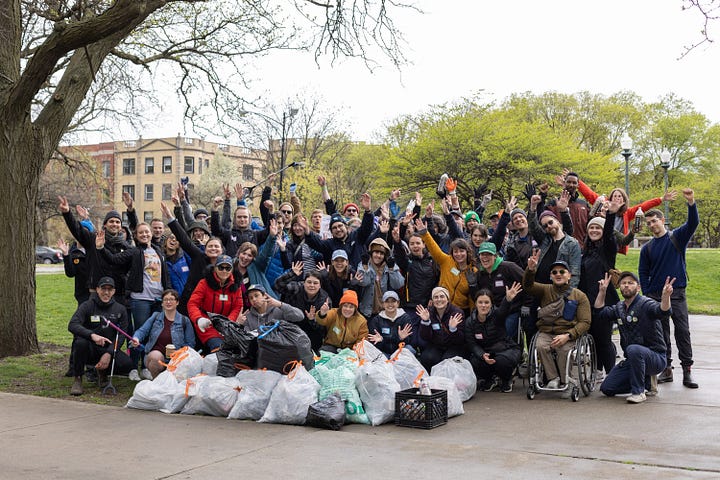
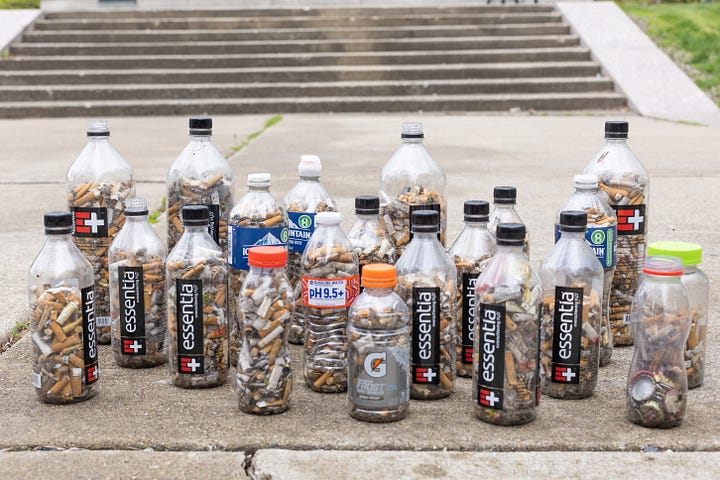
CPN: What has picking up the trash of Logan Square taught you about Logan Square?
Penny: People like some very obscure beers. There’s so many I’ve never even heard of and never would have seen. Less about the trash but more about the people, it’s taught me that there’s people who want to come out and do that as well. It’s so awesome to know we have a community of people who care and are willing to invest their time, and that those people are not alone. Sometimes when you care deeply about something it’s easy to feel like you are.
CPN: What’s the weirdest thing you’ve found while cleaning?
Penny: The one that always sticks out to me is a burrito in a tree. I don’t know why, but it’s so funny to me. That was really early on.
CPN: Like a full burrito, wrapped up and everything?!?
Penny: A full burrito! Also recently someone found some naughty Polaroids in a bush and we were trying to figure out if they were stashed there? Were they thrown away? I really want to know.
CPN: A burrito in a tree is a good one. What’s the most trash you’ve picked up in one session? Do you keep track? Like number of bags or weight or anything?
Penny: We absolutely should keep track, but because we’re so much about the overall experience I tend to forget about doing that. For Earth Day this year we collected well over 200 pounds, though that doesn’t feel like a lot?
CPN: I think that’s a lot.
Penny: A person weighs 200 pounds.
CPN: But what does a bag weigh? And outdoor trash probably isn’t nearly as heavy.
Penny: I’m sure we’ve picked up way more than that. That certainly wasn’t our biggest haul.
CPN: What’s the dirtiest part of Logan Square?
Penny: Milwaukee Avenue. You could clean there every single Saturday, and it wouldn’t be enough.
CPN: We talked about all the other neighborhood branches that opened, is there a gameplan to continue that? Do you want to keep growing?
Penny: I’m mindful that are other local community groups that do something similar. My vision for the organization is to replicate a model introduced by a company called parkrun. They operate three 5K timed runs in parks all over the world, every single Saturday, and each of those groups is volunteer run. So essentially it’s a cooperative non-profit. And every week they have over 200,000 people participating. I feel like we could do the same, except with picking up trash. I would love to be able to come up with a way of empowering community that’s theoretically all over the country and beyond. And again, part of that is I recognize how long it took me to do something. It’s not necessarily difficult to do this, but there are considerations. So if you can give someone a ready made kit, and the tools, and share your knowledge, then hopefully we can make these things happen quicker.
CPN: So with Volunteer Fair, was the impetus that you had a lot of groups reaching out and you wanted to put them all in one space together?
Penny: We had a lot of individuals reaching out. We had too many volunteers, which isn’t usually a problem that most non-profits have. And I think that comes back to us just being really accessible. Aside from signing up, people just show up. It’s really low key, and our branding is kind of silly. You don’t have to be Holier-than-thou to come out to one of our events, you can literally be a trash person and you’re welcome. We had a lot of people who wanted to come do this with us, and it felt like the right thing to do was to show them other opportunities. So as I was learning about other non-profits that do great work in all different different areas of Chicago, and I mean that both geographically as well as with the issues they address, I thought it was a good idea to find some other ways for people to get involved.
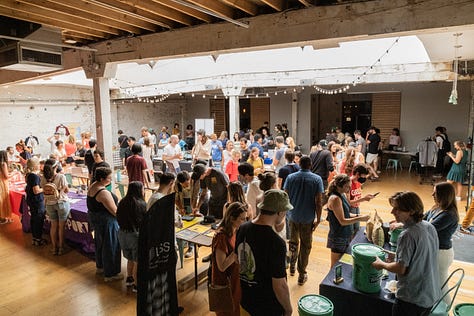
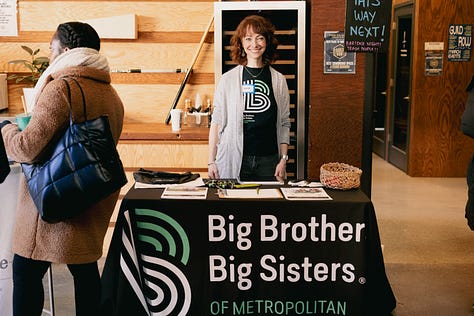
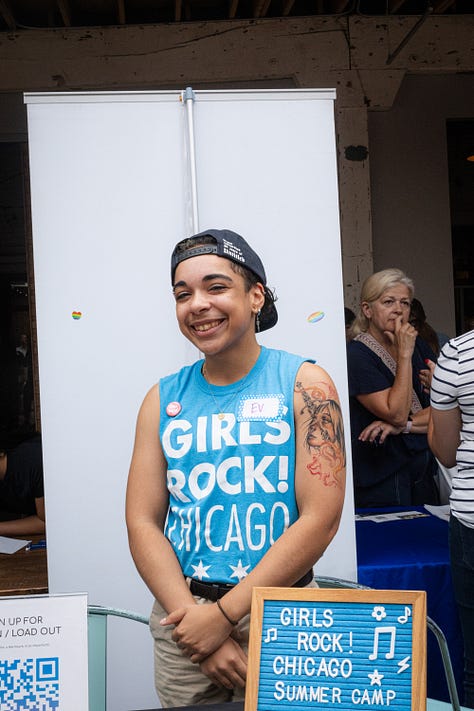
CPN: When did you first have the idea for The Parlor? Where did that come from?
Penny: When the migrant crisis was really sort of at its peak last spring we saw a responsibility to utilize our community to try and help. We got involved with a church called New Hope and we helped to set up and facilitate a community space for migrants who were staying at the police station to shower and use the facilities at the community space. That ended up winding down, but all of our experiences that year with distributing clothing donations, and working with other groups that had donations, I was seeing so much innefficiency, and really so much waste. Lots of things had been dropped off that weren’t appropriate for the community we were trying to support. Whether that be because it wasn’t the sizes that were needed, or people were dropping off like, party dresses, and suits. So putting all the pieces together we came up with an idea that we could be a connection hub for lots of different items, which made it really easy for anybody in the community to donate in one place, and then we would make sure your item goes to the place where it’s needed most. So for example, typically in the migrant community small and medium are the most requested sizes, but I also have community partners that specifically need size extra large and large. That’s not something that’s necessarily communicated, or that people know or recognize when they’re dropping items off somewhere. So through The Parlor were able to maximize the benefit.
CPN: What’s the best way for people to keep track of all the things you’re doing?
Penny: The best way is probably Instagram. Even though we post about all of our projects on there, the main Trash People Instagram is @trashpeopleoflogansquare, but you can also find us @theparlorchicago, and @thevolunteerfair. We also have a website, but it’s not up to date right now.
CPN: Do you have any advice for people who might like to get involved but for whatever reason feel hesitant?
Penny: I felt hesitant. I know how scary it is. It can be really intimidating putting yourself in new social situations, but the people we get coming to our events are really lovely, and will be really happy to make a new friend or have a conversation with someone they haven’t met before. Everybody is there for the same reason, which is to be a community, and meet new people, and contribute in the same way. Everybody is truly welcome and really encouraged to come. We really want to see you there.
CPN: What about for someone who wants to start their own project, or do something like you do?
Penny: Just fucking do it! If you have the capacity, and you have the idea, please, please, please, just do it. We need to move things forward, and your idea is probably a good one.
CPN: Last one, is there anything else you want people to know about Trash People, or The Volunteer Fair, or The Parlor, or all three?
Penny: We’re entirely community funded right now. It’s really hard to get your first grant when you’re a non-profit. Until you’ve had a grant, no one thinks you should get a grant. So if any of our work has resonated with people and they’d like to help us with fundraising, or to donate, we would love that.
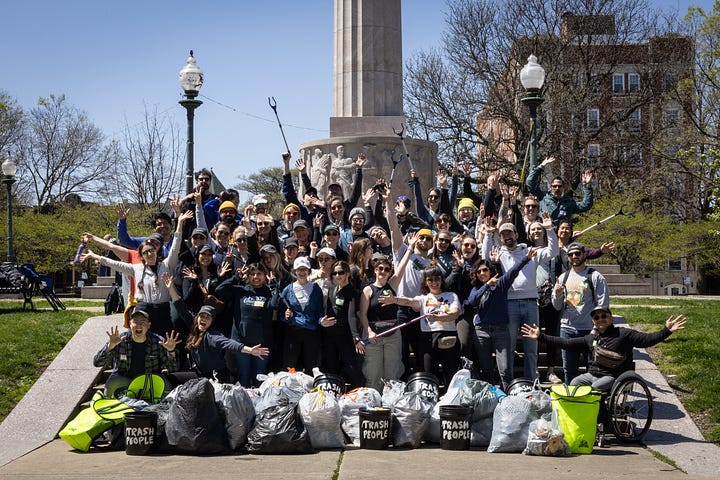
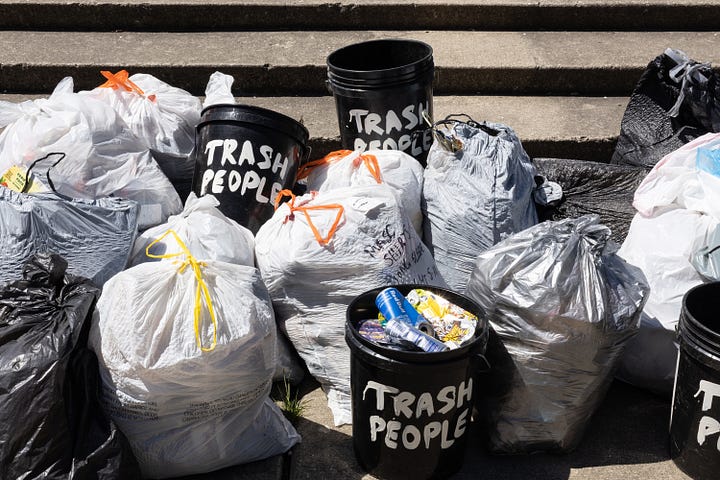
There’s currently a betterworld campaign set up to help The Parlor raise money for rent and expenses for their pop-up "free store" in Logan Square. You can find the link to that campaign right here.
If you’d like to donate to Trash People directly you can also do that via their website, right here.
And if you’d like to read more about The Parlor, Block Club did a wonderful in-depth write up last winter that you can find right here.





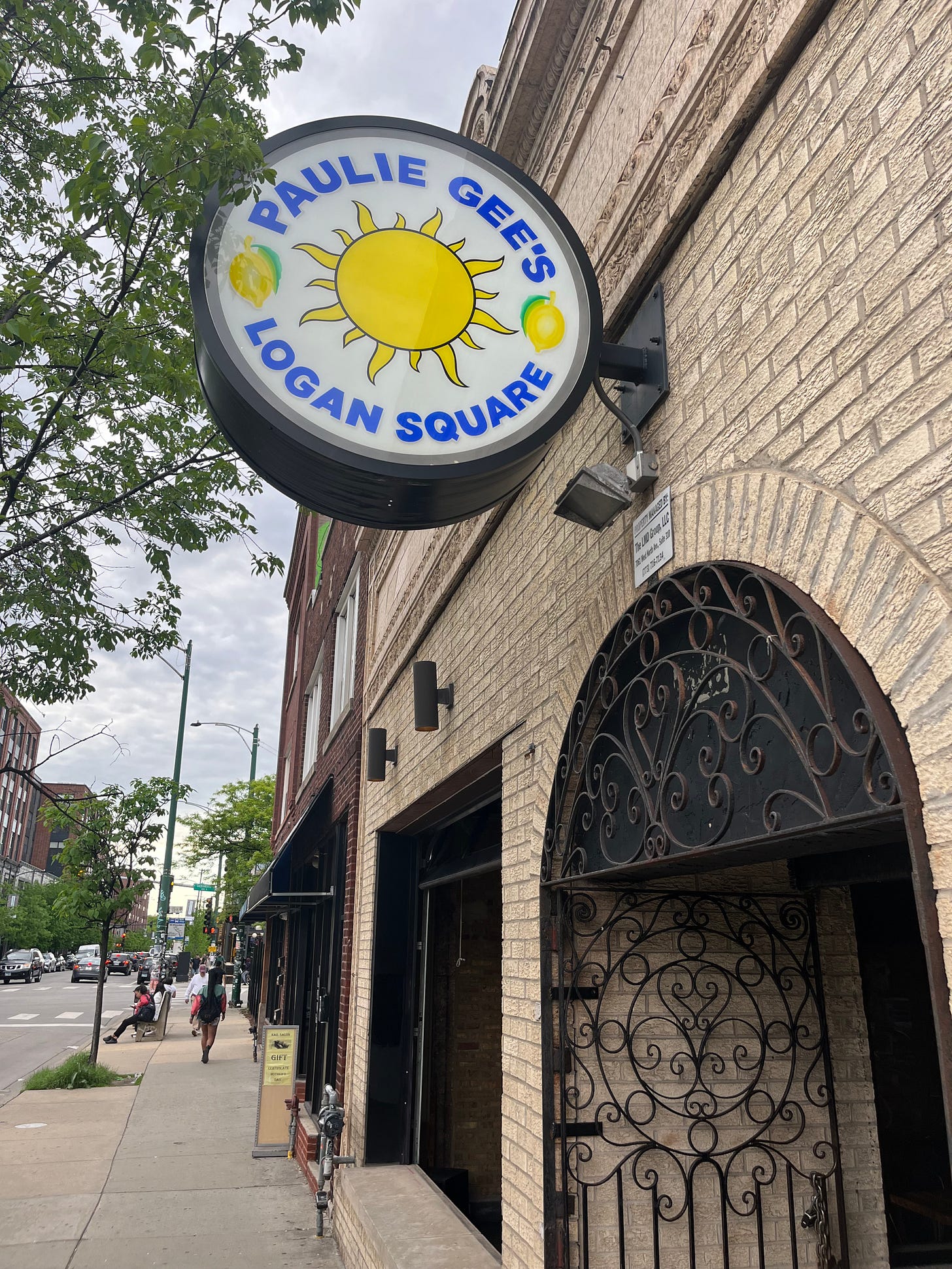
Penny is an incredible human. Great post!